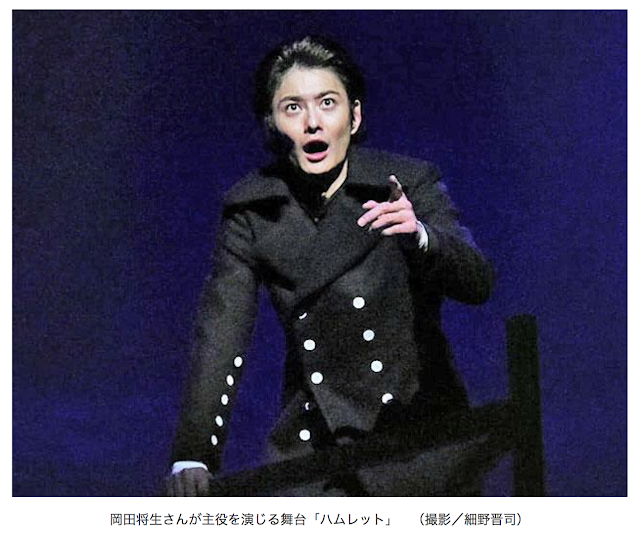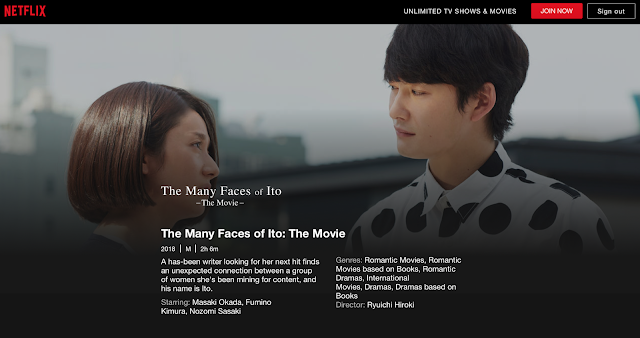Nobue Hiroshi’s review of ‘Hamlet’ in Asahi Weekly
 |
| Okada Masaki as Hamlet (photo by Hosono Shinji) |
Below is my translation of Nobue Hiroshi’s review of ‘Hamlet’ in Asahi Weekly. 日本語の原作はこちらです。
The true face of Okada Masaki, whose determination is admired by our Radio Man
23 June 2019
By Nobue Hiroshi, translated by Icha, from Asahi.com
With a selection of music, TOKYO FM’s Radio Man Nobue Hiroshi talks about society in his “Radio Pa Pa” series. This time, it’s about “a night in Tsuruhashi Osaka where Okada Masaki collapsed on the spot during a discussion”.
A theatre visualises words and dialogs. A theatre spins out stories that have cross-overs with realities. Tossed into the stage under the gaze of hundreds and thousands of piercing eyes like Damocles’ sword, the actor plays a life where even the strangest thing can happen. A stage without a performer is but a space with nothing. That’s why a one-off purity, a determination if you will, drifts in theatres. It resembles the situation in an independent, silent studio, whereby the performer’s voice relies on a single microphone to handle the whole radio communities. That’s why when I make a radio drama, in many cases, I would request stage actors, instead of voice actors, to appear in my radio drama.
The other day, we had a radio CM production meeting. In the original language of that particular country, we were planning to make a CM about items, things, that are not available in foreign countries. That was where I learned of a Welsh word “Hiraeth”. It’s the feeling of wanting to go back to a place where you can no longer return to.
(by the way, in Japanese, the word 木漏れ日 – komorebi, the sunlight filtering through trees – also has no counterpart in other languages)
This place that I can no longer return to… I want to return to the very place where I can no longer go back…
Whether it is a stage play, a literature piece, or a piece of music, perhaps a work of art was created with the purpose of giving this ‘hiraeth’ feeling. That’s why the audience pay to go to a physical place of appreciation.
I watched Okada Masaki’s ‘Hamlet’. Earlier, fellow actor Katsumura Masanobu brought Okada to a restaurant in Tokushima in Sangenjaya Tokyo and to a Korean one in Tsuruhashi Osaka for a drink. At Tsuruhashi, perhaps because of the strain and overwork after the Osaka performance, Okada actually collapsed on the spot during the discussion. I admired his determination.
The Hamlet played by Okada Masaki bore a close resemblance to Murakami Ryu's "Coin Locker Babies" and Stanley Kubrick's movie "A Clockwork Orange." He was like a fierce panther overflowing with joie de vivre; he was always impulsive.
‘Hamlet’ is a story of a son who wanted to kill his uncle for killing his dearly beloved father, and in doing so, it becomes a story where fathers are killed.
It’s the genius of Shakespeare that this work enables the audience to identify themselves with the characters despite the royal family setting.
How does the story move when a person exploded in rage?
When a protagonist was transformed into an aberrant existence, what will happen to the surroundings?
After the performance, my heart and body couldn’t stop shivering for a while. Possessed by Hamlet, Okada Masaki’s voice stubbornly kept me awake. Like an actor who has been promised a leading role in advance, he performed adolescent urges straight through. Co-star Kuroki Haru also performed well in portraying Ophelia’s sorrow and madness because her father was killed by her dearly beloved Hamlet. Her escalated singing voice cut through Theatre Cocoon’s ceilings, releasing all her emotions.
Although the “To be or not to be” soliloquy is rather famous, a person like Hamlet (who is questioning him/herself) exists in every day and age. A new era is created while destroying the authority symbolised by a father figure.
“From deep within my heart, I truly love the stage,” Okada made up his mind. As for Yamazaki Hajime (Polonius), Akimoto Naomi, Marī Machida, Nagashima Keizo, they are regulars in my radio drama program. The audience thus can close their eyes and just enjoy the tragedy and comedy of life through their voices.
This review appears in Asahi Weekly on 28 June 2019.
Nobue Hiroshi (延江浩) was born in Tokyo in 1958. He is a Keio University graduate and the TFM Executive Planner. The National Literature Research Museum and the Agency for Cultural Affairs co-sponsored his "Art Co-Creation Lab". He won numerous awards, including the Newcomer Award of the Modern Novel category of the Asia Pacific Broadcasting Association, Documentary Category Grand Prix, Japan Broadcasting System Cultural Grand Prix Grand Prix, Galaxy Grand Prize, etc.
-xxx-
Icha’s footnote:
In the sixth paragraph (when Nobue-San said he watched 'Hamlet'), I translated “determination” from “潔さ” or “isagiyosa”, which was taken from the phrase 「その潔さに感服した」. Let me know if this translation is not correct. “Isagiyosa” can also be translated into “innocence”, “purity”, “bravery”, or “manliness”. However, since the context is within a discussion, I thought “isagiyosa” reflects tenacity or determination more than “bravery” or “innocence” per se – although Simon Godwin himself said that Masaki was filled with strength and courage, in addition to being romantic and tender. Thanks to Wisteria-san for the discussion about “isagiyosa”.
After talking with Wisteria, I revised the translation of ぶっ倒れた to "collapsed". We're not sure if Masaki fainted (OMG, seriously!!!) during that discussion and drinking session, or that he "just" fell asleep during the discussion and drinking session. I HOPE he "just" fell asleep because he was so tired. It makes sense that he "just" fell asleep, because Nobue-san said that he admired Masaki's determination. Which meant that Masaki was so tired that night after the show, hence he collapsed (as in, fell asleep on the spot) while talking with his colleagues. If Masaki fainted (God forbid), Nobue-san would be much more concerned in his article.


